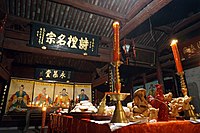Chinese ancestor veneration

Have you ever heard of someone in your family who lived a long time ago and wasn't alive anymore? It could be your grandfather, great-grandmother, or someone even older than them. Your family might talk about them sometimes and remember things they did. In Chinese culture, people also remember their ancestors who have passed away.
Ancestor veneration is when people show respect and honor to their ancestors who have died. It's like saying "thank you" and "I remember you" to someone who is no longer alive. Chinese people believe that their ancestors still have an important role in their family even after they have passed away. Ancestor veneration is an important part of Chinese culture and is practiced by many families.
In Chinese ancestor veneration, families create altars to honor their ancestors. The altar usually has a table with offerings like incense, fruit, food, and drinks. These offerings are given to show respect and gratitude to the ancestors. The family also burns incense which is a way of communicating with the ancestors and seeking their blessings.
Chinese families also have special ceremonies to remember their ancestors. The most important one is the Qingming Festival where families visit the graves of their ancestors to clean them and offer food, incense, and other offerings. During this festival, families also burn paper offerings which are things that the ancestors might need in the afterlife. These paper offerings can include anything from money to clothes.
Overall, ancestor veneration is an important tradition in Chinese culture that helps families remember and honor their ancestors who have passed away. By participating in these customs, Chinese people show respect and gratitude to their ancestors who have played an important role in their family's history.
Ancestor veneration is when people show respect and honor to their ancestors who have died. It's like saying "thank you" and "I remember you" to someone who is no longer alive. Chinese people believe that their ancestors still have an important role in their family even after they have passed away. Ancestor veneration is an important part of Chinese culture and is practiced by many families.
In Chinese ancestor veneration, families create altars to honor their ancestors. The altar usually has a table with offerings like incense, fruit, food, and drinks. These offerings are given to show respect and gratitude to the ancestors. The family also burns incense which is a way of communicating with the ancestors and seeking their blessings.
Chinese families also have special ceremonies to remember their ancestors. The most important one is the Qingming Festival where families visit the graves of their ancestors to clean them and offer food, incense, and other offerings. During this festival, families also burn paper offerings which are things that the ancestors might need in the afterlife. These paper offerings can include anything from money to clothes.
Overall, ancestor veneration is an important tradition in Chinese culture that helps families remember and honor their ancestors who have passed away. By participating in these customs, Chinese people show respect and gratitude to their ancestors who have played an important role in their family's history.
Related topics others have asked about:
